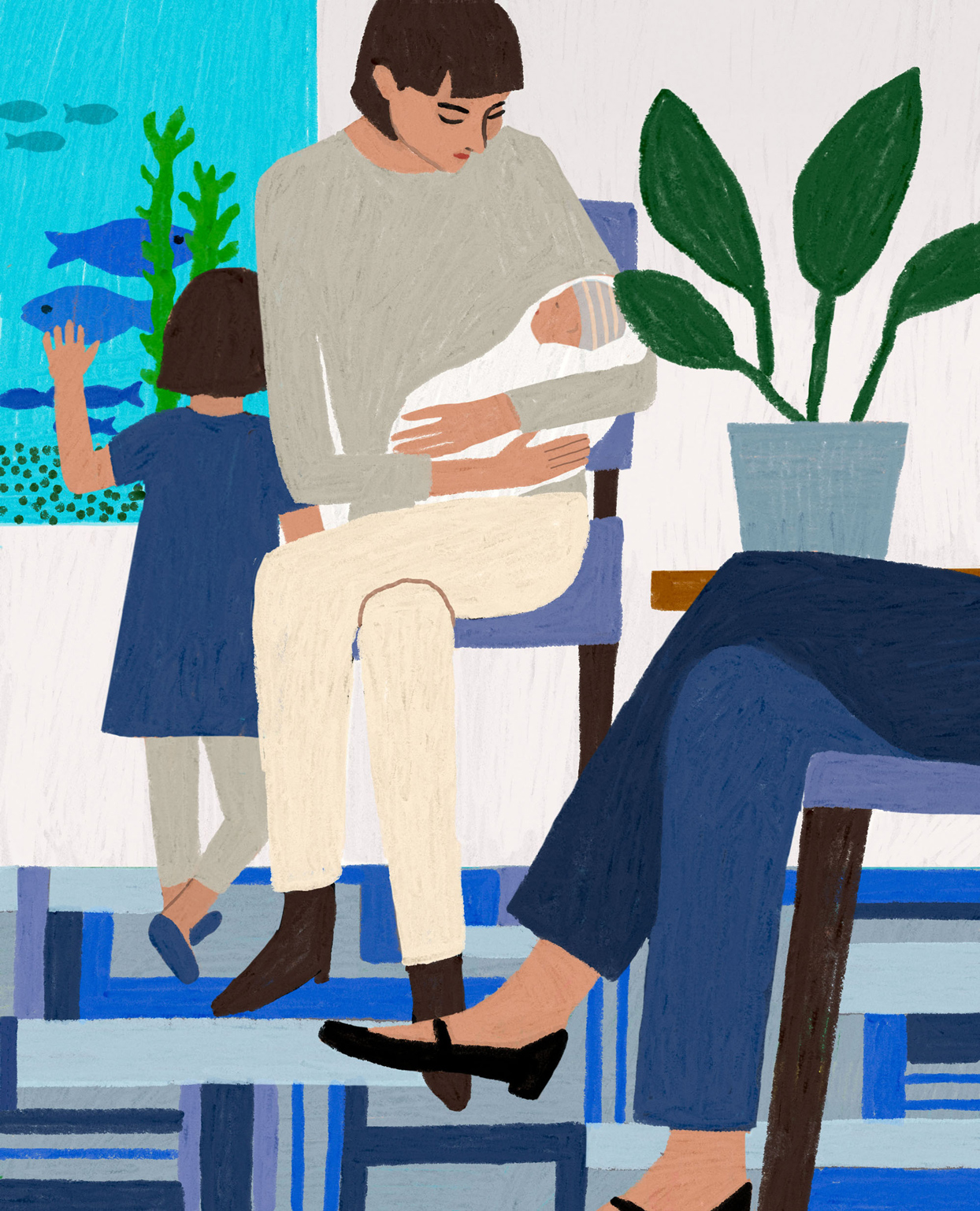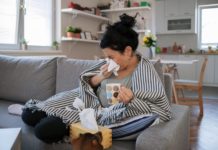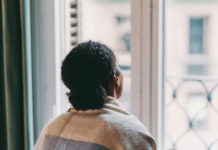
My water broke at 4 p.m., and by 4:20, I held her. Annie: 8 pounds, 2 ounces, with thick, dark hair and a calm gaze. She was our surprise gift, the second baby we assumed we couldn't have.
Everything about her had been easy—conception, pregnancy, birth. But as the days became weeks, she wouldn't gain weight. "How many ounces are you feeding her?" asked the pediatrician. We were feeding her the ounces, but it took all day. She wouldn't latch, had a hard time sucking a bottle. My first baby, too, had lost weight, then rebounded, but this time the pediatrician seemed worried.
Annie slept well. "Look how she sleeps," we said. Her sister, Sylvie, had screamed when we put her down. Sylvie's eyes were big, bright, burning—still are. She couldn't get enough music, talking, dancing. "Life!" says Sylvie, now 3, queen of happy chaos.
Annie wanted to lie on the sofa with her eyes closed. She just wanted air. Her skin sank to her bones. Online, I found a post about babies who were "content to starve." I woke Annie, forced milk into her. She looked up, eyes expressionless.
After five weeks, we hired a nanny to help us with a new, backbreaking feeding protocol. She arrived in a sweatshirt and false eyelashes and fed the baby. On her third day, she came out of the bedroom and said, "This baby is not okay." Annie couldn't hold her head in any position. She flopped like a doll with too little stuffing. "You need to go to the hospital."
We went to the E.R. "What changed to bring you here?" the nurse asked. Annie lay on a blue medical cot.
"Nothing," I said. "I guess that's the problem. She won't eat. She's too floppy." The nurse betrayed no emotion. She lifted the baby's arm, her leg. I thought she'd tell me to relax, that it was all fine.
"She's hypotonic," she said, meaning she had almost no muscle tone. "Do you have things for a hospital stay?"
"Overnight?" I asked.
"Oh, longer than that," said the nurse. I held my baby in that room, awaiting admission. I looked at the machines. We were cold. I asked for a blanket. The nurse brought us a pile. There would never be enough to cover us. There weren't enough blankets in the world.
Don, my husband, was at a conference. Somehow Sylvie got to the hospital. I don't recall how. I remember the hospital room had a large window, but it overlooked a building. I remember water bottles and cups and syringes and the big medical-grade breast pump into which I leaked milk that they immediately stopped feeding Annie.
Annie, despite all our efforts, was dangerously malnourished. She'd lost all her strength, and even, we'd soon learn, her ability to swallow. The pediatrician suspected a dairy intolerance, but the floppiness seemed severe, and no diagnostic tests existed for this. Doctors had to eliminate every other problem: metabolic and neurological conditions, many life-altering or fatal. She might be fine. She might be disabled. She might die. Those were the forks in the road. She wasn't currently okay. I left my body.
Where did I go? I was there in the room as they strung a tube into Annie's nose and she gagged and screamed a scream no mother should ever hear, pitiful and piglet-like. My whole body went to her, and yet I couldn't go to her, so I left the room, crying. I called Don, who could do nothing. I was not in the hall anymore but with my mother years before as they strung her with tubes, when she was breathless and blotto with pain, set out on her big bed to die. I met my young self there, in the space outside my body. I was right where I had left myself, staring and shivering, calm and not at all calm, back in that horrific limbo that exists right outside us, that we all sort of know is there, that we do anything to avoid.
I cried in the hall and I said I can't take it, but there was nothing anyone could do. The nurses looked at me with compassion. They were so good at their jobs. The summer sun shone and shone.
Parades of specialists lifted the baby's slack limbs. A man walked down the hall with a cart filled with popcorn and lollipops. I wanted to defend the baby. She was born healthy, an easy pregnancy, easy birth. I had an amniocentesis with all the add-ons. We had looked for every rare problem. I birthed her at 43 years old, a normally conceived perfect baby after six years of trying to have Sylvie. Annie was a message from the universe about surprises that are wonderful rather than terrible—that was the sense that I'd made of her entrance.
"Well, those prenatal tests do rule out some possibilities," our pediatrician said.
A doctor mentioned cystic fibrosis. "Didn't we test for it?" I said.
"You tested for the most common mutation," the doctor said. "We have to decide if we should test for rarer forms."
They took blood for a panel that tested for 80 metabolic conditions. I sat on an upholstered hospital bench for days as the results filtered in. Negative. Negative. "This is good!" said the doctors.
"So she's going to be okay?" I asked, over and over again, like a broken toy.
"I wish I could tell you that," said the doctor. "But it would be irresponsible."
My father came. "Is it reasonable to hope that the baby might be okay?" he asked.
"Yes, it's reasonable," the doctor said.
Such unstoppable crying. But I felt in some secret part of myself that she would be okay. I shut the thought out, not wanting to jinx it. I had to stay vigilant.
While I spoke to the doctors, Sylvie scampered down the halls in a dirty blue dress. She loved the popcorn guy. She found a dinosaur to climb. She looked out the big windows at the summertime. Life! Life! She made faces at her sister.
If Annie is okay, I told God, I will never complain about how hard this has been. I will bottle this up, shove it down, and every day acknowledge the beauty of Annie and Sylvie and my luck, which is balanced on a knife blade. As my mother died, I had offered God years of my life, digits of my hand, to no avail. This time, I made simpler arrangements: If Annie's okay, I will appreciate that forever.
As Annie ate the special formula by tube in the hospital, she began to gain weight. The doctors smiled. "A good sign," they said. After a week, they sent us home with a whirring machine, feeding bags, tubes, formula that smelled of bile.
Annie grew but remained hypotonic. She had trouble lifting her head. Don sat on the rug, pulling her up by her arms, making her practice. Her tube would slip out and Don learned how to put it back in, measuring and shoving it down her throat as she tried to protest. Once, I thought she'd swallowed the entire tube and drove to the E.R., frantic. The doctor said he'd never had this happen—was I sure she hadn't ripped it out? I suddenly felt very unsure. Don's aunt checked the house for us and found the tube. It got caught on some clothing when I changed her. "Oh," I said. "I think maybe I am not completely sane right now."
I paid the $250 co-pay like a penance. Money, by the way. You can guess what money was up to.
Out in the world, people would approach the stroller smiling, then see Annie's tubes and back away. They'd wanted a glimpse of joy, of new life, and instead glimpsed a tragedy. It was cruel in an animal way. "Just say hello!" I would vent to Don. "What is so hard about it?"
At endless appointments, the doctors still didn't know what was wrong but wanted it to be malabsorption due to dairy proteins. Eventually, the baby bent her limbs like a regular baby. We cheered for Annie, said "Look!" to the doctor, as our baby did nothing but bend her leg.
I went on a special diet, pumping and saving milk. Finally, I dared feed it to her via the tube. It was fine unless I ate out or there was a trace of dairy in my food, in which case Annie would be sick and I'd need to stop feeding her my milk.
"It's good she gets sick when you have dairy!" the doctor said. "It's more data!"
By five months, we took the feeding tube out. Annie sat up by seven months. She lifted toys, banged them together. She even laughed, a halting little barky noise. When she smiled, she squinted.
A friend told me the story of her son's birth. The woman next to her in recovery, separated by a partition, lost her baby during delivery. My friend held her own baby, listening to the wailing. "I felt like death had passed over me and landed just a few feet away," she said. "And I knew that would be forever bound up in my feelings about my son."
It took longer to discover Annie, to figure out who she was. Now I tickle her and she shrieks with laughter. She wants to be held, hates exercise, loves to watch her sister run, jump, and "party up." She can play with a toy for 20 minutes. She has a serious face that she turns on strangers. She waves her arms for Don, kicking and yelling with joy when he enters the room. When I enter the room, she grins and melts her body toward me. Yesterday, she was mad at me for putting her down, and in the midst of crying, I swear she said "Mama."
"Did you say 'Mama'?" I said. The room was messy, will probably be so forever.
I assume she will say it. The luxury of this—it will never be lost on me.
This article originally appeared in Parents magazine's February 2021 issue as "This Baby is Not Okay." Want more from the magazine? Sign up for a monthly print subscription here
Parents magazine





